交际能力与交际文化,英语例文.doc
- 格式:doc
- 大小:84.50 KB
- 文档页数:9
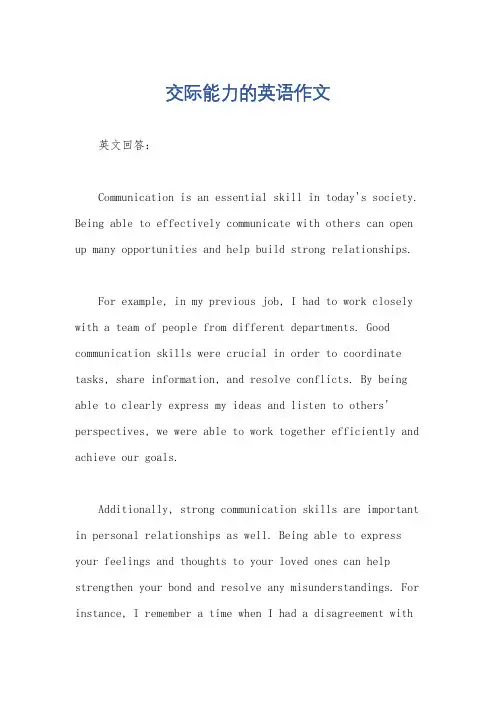
交际能力的英语作文英文回答:Communication is an essential skill in today's society. Being able to effectively communicate with others can open up many opportunities and help build strong relationships.For example, in my previous job, I had to work closely with a team of people from different departments. Good communication skills were crucial in order to coordinate tasks, share information, and resolve conflicts. By being able to clearly express my ideas and listen to others' perspectives, we were able to work together efficiently and achieve our goals.Additionally, strong communication skills are important in personal relationships as well. Being able to express your feelings and thoughts to your loved ones can help strengthen your bond and resolve any misunderstandings. For instance, I remember a time when I had a disagreement witha close friend. Instead of avoiding the issue, we sat down and had an open and honest conversation. By communicating openly and respectfully, we were able to understand each other's viewpoints and resolve the conflict.In conclusion, developing good communication skills is crucial in both professional and personal settings. By being able to communicate effectively, you can build strong relationships, resolve conflicts, and achieve success in various aspects of your life.中文回答:交际能力在当今社会是至关重要的。
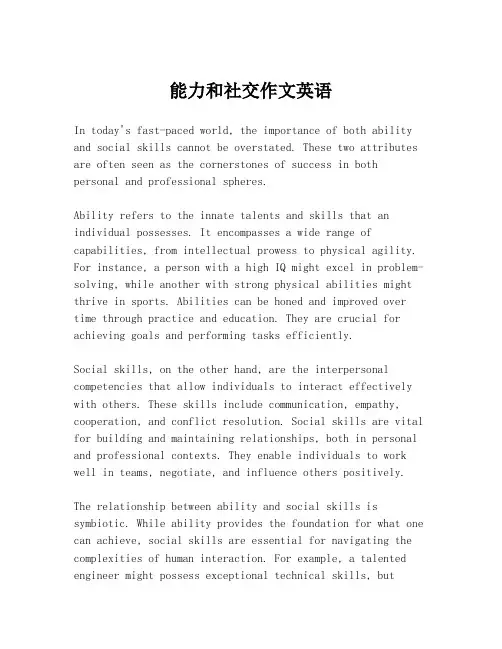
能力和社交作文英语In today's fast-paced world, the importance of both ability and social skills cannot be overstated. These two attributes are often seen as the cornerstones of success in both personal and professional spheres.Ability refers to the innate talents and skills that an individual possesses. It encompasses a wide range of capabilities, from intellectual prowess to physical agility. For instance, a person with a high IQ might excel in problem-solving, while another with strong physical abilities might thrive in sports. Abilities can be honed and improved over time through practice and education. They are crucial for achieving goals and performing tasks efficiently.Social skills, on the other hand, are the interpersonal competencies that allow individuals to interact effectively with others. These skills include communication, empathy, cooperation, and conflict resolution. Social skills are vital for building and maintaining relationships, both in personal and professional contexts. They enable individuals to work well in teams, negotiate, and influence others positively.The relationship between ability and social skills is symbiotic. While ability provides the foundation for what one can achieve, social skills are essential for navigating the complexities of human interaction. For example, a talented engineer might possess exceptional technical skills, butwithout the ability to communicate effectively with colleagues, their potential may remain untapped.In the workplace, the combination of ability and socialskills is particularly important. An employee with both a strong skill set and the ability to work well with others is more likely to succeed. They can contribute to the team's success, lead projects, and advance their career.Moreover, in the context of education, students who have both academic abilities and social skills are often more successful. They can engage with their peers, participate in group projects, and seek help when needed, leading to a more enriching learning experience.In conclusion, while ability is a crucial determinant of what one can achieve, social skills are equally important for how one achieves it. Both are necessary for personal growth, professional advancement, and overall success in life. Cultivating both abilities and social skills should be a priority for anyone looking to thrive in today's interconnected world.。
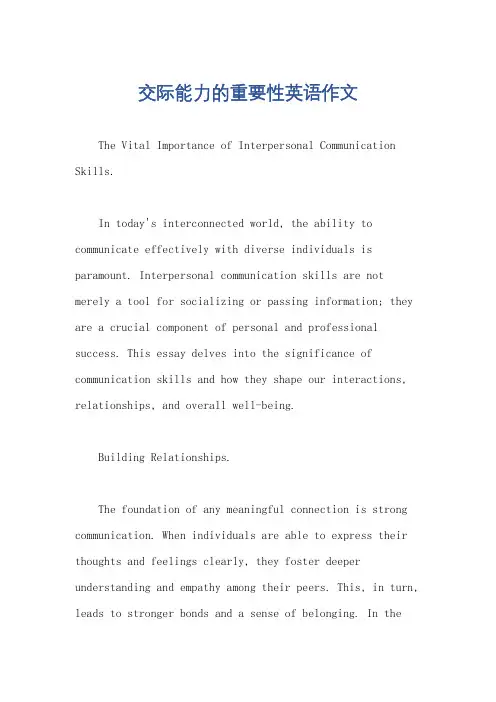
交际能力的重要性英语作文The Vital Importance of Interpersonal Communication Skills.In today's interconnected world, the ability to communicate effectively with diverse individuals is paramount. Interpersonal communication skills are not merely a tool for socializing or passing information; they are a crucial component of personal and professional success. This essay delves into the significance of communication skills and how they shape our interactions, relationships, and overall well-being.Building Relationships.The foundation of any meaningful connection is strong communication. When individuals are able to express their thoughts and feelings clearly, they foster deeper understanding and empathy among their peers. This, in turn, leads to stronger bonds and a sense of belonging. In theworkplace, effective communication is essential for team building and collaboration. It ensures that everyone is on the same page, understanding their roles and responsibilities, while fostering a positive and inclusive environment.Professional Advancement.In the corporate world, communication skills are often valued above other technical abilities. Employees who can articulate their ideas, present data effectively, and negotiate with colleagues are more likely to stand out and advance in their careers. Additionally, strong communication skills are essential for leaders, as theyneed to motivate their teams, resolve conflicts, and communicate vision and strategy.Conflict Resolution.Conflict is inevitable in any social or professional setting. However, the manner in which it is handled can either escalate the situation or lead to amicable solutions.Communication skills play a pivotal role in conflict resolution. They enable individuals to listen actively, understand the other party's perspective, and express their own views in a non-threatening manner. This approach often leads to mutual understanding and the resolution of issues.Personal Growth.Communication skills are not static; they evolve and improve as individuals gain experience and reflect on their interactions. By constantly evaluating their communication style and seeking feedback, people can identify areas for improvement and become more self-aware. This self-awareness leads to greater confidence, which, in turn, encourages individuals to take on more challenging situations and grow beyond their comfort zones.Cultural Understanding.In a globalized world, cross-cultural communication is becoming increasingly important. People from diverse backgrounds bring unique perspectives and communicationstyles to the table. Having strong communication skills enables individuals to navigate these differences, appreciate diverse viewpoints, and avoid misunderstandings that can arise from cultural disparities.Conclusion.Interpersonal communication skills are the lifeblood of any successful interaction. They are the glue that binds relationships, the driver of professional advancement, the key to conflict resolution, and the foundation of personal growth. In essence, they are what make us human social beings who thrive on connection and understanding. As we move forward in an increasingly interconnected world, it is imperative that we cultivate and hone these skills to ensure our own success and the harmony of our communities.。
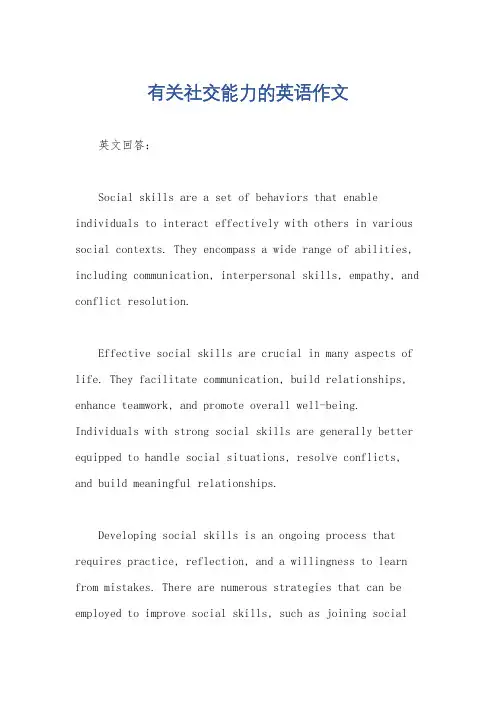
有关社交能力的英语作文英文回答:Social skills are a set of behaviors that enable individuals to interact effectively with others in various social contexts. They encompass a wide range of abilities, including communication, interpersonal skills, empathy, and conflict resolution.Effective social skills are crucial in many aspects of life. They facilitate communication, build relationships, enhance teamwork, and promote overall well-being. Individuals with strong social skills are generally better equipped to handle social situations, resolve conflicts, and build meaningful relationships.Developing social skills is an ongoing process that requires practice, reflection, and a willingness to learn from mistakes. There are numerous strategies that can be employed to improve social skills, such as joining socialgroups, practicing active listening, and seeking feedback from others.中文回答:社交技能是指个人在不同社交环境中与他人有效互动的一系列行为。
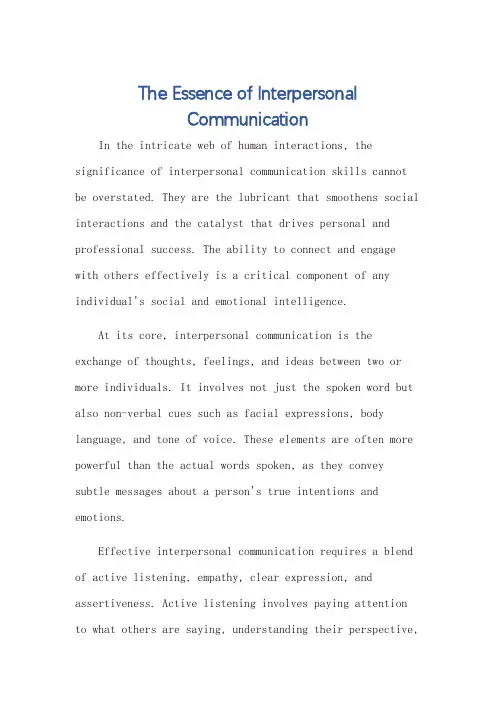
The Essence of InterpersonalCommunicationIn the intricate web of human interactions, the significance of interpersonal communication skills cannot be overstated. They are the lubricant that smoothens social interactions and the catalyst that drives personal and professional success. The ability to connect and engage with others effectively is a critical component of any individual's social and emotional intelligence.At its core, interpersonal communication is the exchange of thoughts, feelings, and ideas between two or more individuals. It involves not just the spoken word but also non-verbal cues such as facial expressions, body language, and tone of voice. These elements are often more powerful than the actual words spoken, as they convey subtle messages about a person's true intentions and emotions.Effective interpersonal communication requires a blend of active listening, empathy, clear expression, and assertiveness. Active listening involves paying attention to what others are saying, understanding their perspective,and responding appropriately. Empathy allows us to connect with others emotionally, understanding their feelings and needs. Clear expression ensures that our thoughts and ideas are传达accurately and understood by others. Assertiveness, on the other hand, helps us communicate our needs and boundaries effectively without being aggressive or passive. In the workplace, strong interpersonal communication skills are essential for building trust, resolving conflicts, and fostering collaboration. They are the backbone of teamwork, enabling members to work together harmoniously towards common goals. Moreover, they are crucial for effective leadership, as leaders need to communicate vision, direction, and expectations clearly to their teams.In personal relationships, interpersonal communication skills play a pivotal role in maintaining healthy and fulfilling relationships. They are essential for resolving disputes, communicating needs and expectations, and fostering understanding and empathy. By expressing ourselves effectively and listening attentively to others,we can build stronger bonds and deeper connections with those we care about.However, developing strong interpersonal communication skills is not always easy. It requires conscious effort, practice, and reflection. We need to be mindful of our communication style and the impact it has on others. Weneed to be willing to adapt and learn from our mistakes, constantly improving our ability to connect and engage with others.In conclusion, interpersonal communication skills arean integral part of human life and play a crucial role in personal and professional success. They are the key to effective social interactions, healthy relationships, and successful leadership. By investing in the development of these skills, we can enhance our quality of life and make a positive impact on the lives of those we interact with.**人际交往能力的精髓**在复杂的人际交往中,人际交往能力的重要性不容忽视。
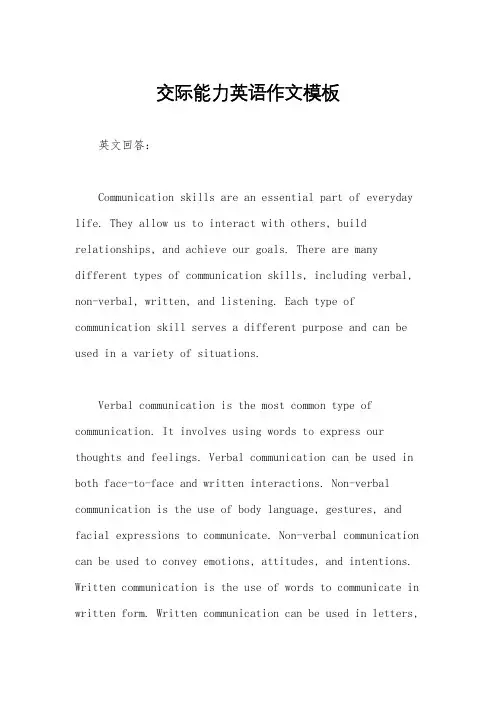
交际能力英语作文模板英文回答:Communication skills are an essential part of everyday life. They allow us to interact with others, build relationships, and achieve our goals. There are many different types of communication skills, including verbal, non-verbal, written, and listening. Each type of communication skill serves a different purpose and can be used in a variety of situations.Verbal communication is the most common type of communication. It involves using words to express our thoughts and feelings. Verbal communication can be used in both face-to-face and written interactions. Non-verbal communication is the use of body language, gestures, and facial expressions to communicate. Non-verbal communication can be used to convey emotions, attitudes, and intentions. Written communication is the use of words to communicate in written form. Written communication can be used in letters,emails, reports, and other documents. Listening is the process of receiving and understanding spoken or written communication. Listening is an important skill for both personal and professional interactions.Communication skills are important for success in all areas of life. They allow us to build relationships, resolve conflicts, and achieve our goals. There are many things we can do to improve our communication skills. We can take courses, read books, and practice our communication skills in everyday situations. By improving our communication skills, we can improve our lives and the lives of those around us.中文回答:沟通能力是日常生活的重要组成部分。
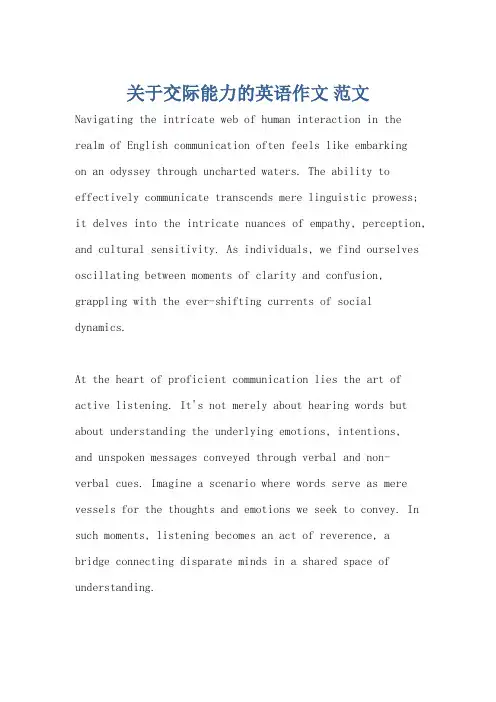
关于交际能力的英语作文范文Navigating the intricate web of human interaction in the realm of English communication often feels like embarkingon an odyssey through uncharted waters. The ability to effectively communicate transcends mere linguistic prowess; it delves into the intricate nuances of empathy, perception, and cultural sensitivity. As individuals, we find ourselves oscillating between moments of clarity and confusion, grappling with the ever-shifting currents of social dynamics.At the heart of proficient communication lies the art of active listening. It's not merely about hearing words but about understanding the underlying emotions, intentions,and unspoken messages conveyed through verbal and non-verbal cues. Imagine a scenario where words serve as mere vessels for the thoughts and emotions we seek to convey. In such moments, listening becomes an act of reverence, a bridge connecting disparate minds in a shared space of understanding.Yet, amidst the cacophony of voices vying for attention, one must also learn the delicate dance of assertiveness. Assertiveness, often misconstrued as aggression, is the art of expressing one's needs and opinions with clarity and confidence while respecting the boundaries and perspectives of others. It's about striking a balance between advocating for oneself and fostering harmonious relationships—a tightrope walk between self-advocacy and empathy.Moreover, effective communication transcends linguistic barriers; it encompasses a deep understanding of cultural nuances and social contexts. Consider the myriad cultural subtleties embedded within language—the unspoken rules of politeness, the nuances of humor, and the significance of gestures. Mastery of a language goes beyond grammar and vocabulary; it entails immersing oneself in the rich tapestry of culture, history, and societal norms that shape linguistic expression.Furthermore, the digital age has ushered in a new era of communication, replete with its own set of challenges and opportunities. In a world where emojis and acronymspunctuate our virtual conversations, the lines between sincerity and sarcasm blur, and misinterpretations abound. The digital realm, while facilitating connectivity across vast distances, also poses a threat to genuine human connection, relegating empathy to the sidelines of abbreviated exchanges.In essence, the journey towards mastering the art of communication is fraught with challenges, yet ripe with opportunities for growth and connection. It's about cultivating a mindset of curiosity and humility, acknowledging that communication is not a destination but a lifelong voyage of discovery. So, as we navigate the labyrinthine corridors of human interaction, let us do so with open hearts, attentive ears, and a willingness to embrace the beauty of connection in all its complexities.。
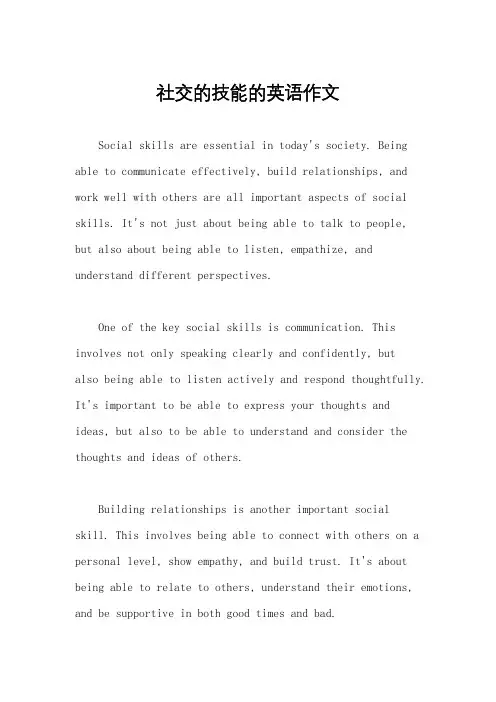
社交的技能的英语作文Social skills are essential in today's society. Being able to communicate effectively, build relationships, and work well with others are all important aspects of social skills. It's not just about being able to talk to people, but also about being able to listen, empathize, and understand different perspectives.One of the key social skills is communication. This involves not only speaking clearly and confidently, butalso being able to listen actively and respond thoughtfully. It's important to be able to express your thoughts and ideas, but also to be able to understand and consider the thoughts and ideas of others.Building relationships is another important socialskill. This involves being able to connect with others on a personal level, show empathy, and build trust. It's about being able to relate to others, understand their emotions, and be supportive in both good times and bad.Working well with others is also crucial. This means being able to collaborate, compromise, and resolveconflicts in a constructive manner. It's about being able to work as part of a team, contribute your ideas, and respect the ideas and contributions of others.Adaptability is an important social skill, as it allows you to navigate different social situations and interact with a wide range of people. Being able to adapt to different personalities, communication styles, and social norms is essential for building successful relationships and thriving in social environments.Lastly, emotional intelligence is a key social skill. This involves being aware of your own emotions and the emotions of others, and being able to manage and express them in a healthy and productive way. It's about being able to understand and regulate your emotions, as well as being able to empathize with and support others in their emotional experiences.。
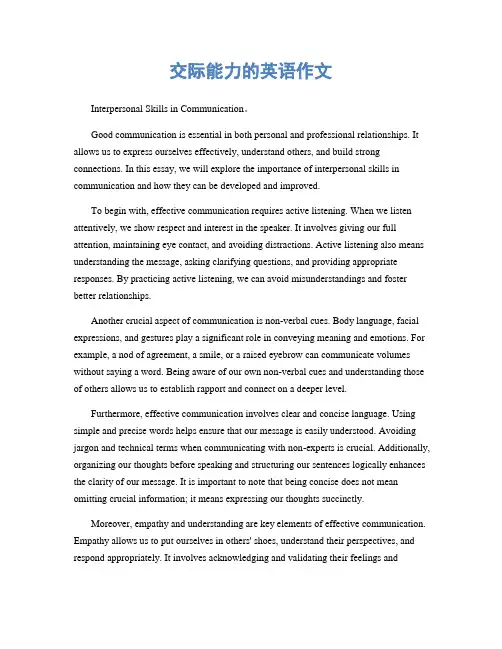
交际能力的英语作文Interpersonal Skills in Communication。
Good communication is essential in both personal and professional relationships. It allows us to express ourselves effectively, understand others, and build strong connections. In this essay, we will explore the importance of interpersonal skills in communication and how they can be developed and improved.To begin with, effective communication requires active listening. When we listen attentively, we show respect and interest in the speaker. It involves giving our full attention, maintaining eye contact, and avoiding distractions. Active listening also means understanding the message, asking clarifying questions, and providing appropriate responses. By practicing active listening, we can avoid misunderstandings and foster better relationships.Another crucial aspect of communication is non-verbal cues. Body language, facial expressions, and gestures play a significant role in conveying meaning and emotions. For example, a nod of agreement, a smile, or a raised eyebrow can communicate volumes without saying a word. Being aware of our own non-verbal cues and understanding those of others allows us to establish rapport and connect on a deeper level.Furthermore, effective communication involves clear and concise language. Using simple and precise words helps ensure that our message is easily understood. Avoiding jargon and technical terms when communicating with non-experts is crucial. Additionally, organizing our thoughts before speaking and structuring our sentences logically enhances the clarity of our message. It is important to note that being concise does not mean omitting crucial information; it means expressing our thoughts succinctly.Moreover, empathy and understanding are key elements of effective communication. Empathy allows us to put ourselves in others' shoes, understand their perspectives, and respond appropriately. It involves acknowledging and validating their feelings andemotions. By demonstrating empathy, we create a safe and supportive environment for open and honest communication.In addition, effective communication requires adaptability. Different situations and individuals may require different communication styles. Being able to adjust our approach based on the context and the needs of the people we are interacting with is essential. This flexibility allows us to communicate effectively with diverse groups and build strong relationships based on mutual understanding.Lastly, resolving conflicts through effective communication is crucial in maintaining healthy relationships. Conflict is inevitable in any interaction, but how we handle it can make a significant difference. By actively listening, expressing ourselves clearly, and being open to compromise, we can find solutions that satisfy both parties. Effective communication during conflicts also involves managing emotions and staying calm, which helps promote understanding and cooperation.In conclusion, interpersonal skills are essential for effective communication. Active listening, non-verbal cues, clear language, empathy, adaptability, and conflict resolution are all crucial elements. By continuously developing and improving these skills, we can build stronger relationships, avoid misunderstandings, and foster a positive and productive environment. Effective communication is a lifelong learning process that requires practice, patience, and a genuine desire to connect with others.。
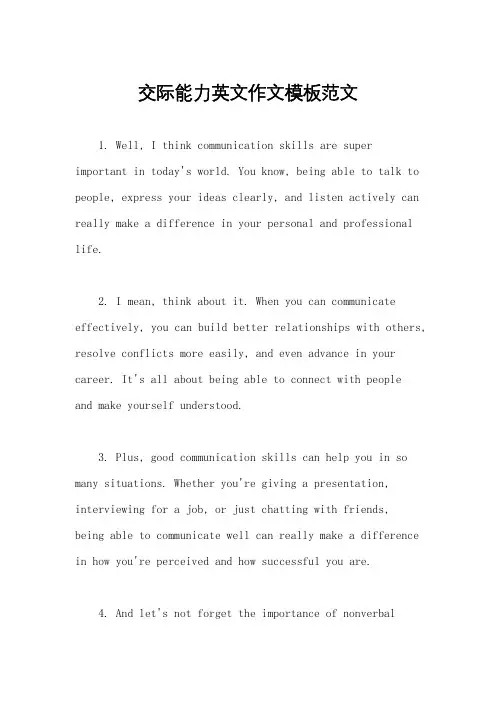
交际能力英文作文模板范文1. Well, I think communication skills are super important in today's world. You know, being able to talk to people, express your ideas clearly, and listen actively can really make a difference in your personal and professional life.2. I mean, think about it. When you can communicate effectively, you can build better relationships with others, resolve conflicts more easily, and even advance in your career. It's all about being able to connect with peopleand make yourself understood.3. Plus, good communication skills can help you in so many situations. Whether you're giving a presentation, interviewing for a job, or just chatting with friends,being able to communicate well can really make a difference in how you're perceived and how successful you are.4. And let's not forget the importance of nonverbalcommunication. You know, things like body language, facial expressions, and tone of voice can all play a big role in how your message is received. So it's not just about what you say, but also how you say it.5. So yeah, I definitely think that improving your communication skills is worth the effort. Whether it's through practice, training, or just being more mindful of how you communicate, there are plenty of ways to become a better communicator. And trust me, it's totally worth it in the end.。
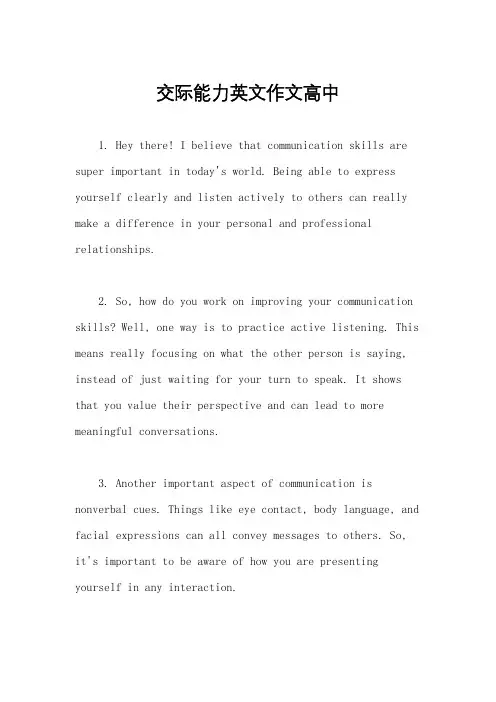
交际能力英文作文高中1. Hey there! I believe that communication skills are super important in today's world. Being able to express yourself clearly and listen actively to others can really make a difference in your personal and professional relationships.2. So, how do you work on improving your communication skills? Well, one way is to practice active listening. This means really focusing on what the other person is saying, instead of just waiting for your turn to speak. It shows that you value their perspective and can lead to more meaningful conversations.3. Another important aspect of communication is nonverbal cues. Things like eye contact, body language, and facial expressions can all convey messages to others. So, it's important to be aware of how you are presenting yourself in any interaction.4. And let's not forget about the power of empathy in communication. Putting yourself in someone else's shoes and trying to understand their feelings and perspective can go a long way in building trust and connection with others.5. Overall, effective communication is all about being genuine, respectful, and open to different viewpoints. By honing your communication skills, you can navigate any social or professional situation with confidence and ease. So, keep practicing and never underestimate the power of a good conversation!。
交际能力英文作文高中作文英文:As a high school student, I believe that communication skills are essential for success in both academic andsocial settings. Being able to effectively communicate with others can help build strong relationships, resolve conflicts, and convey ideas clearly. In my experience, I have found that good communication skills have helped me in many aspects of my life.For example, in group projects, being able to communicate effectively with my peers has helped us work together more efficiently and produce better results. By listening to each other's ideas and providing constructive feedback, we were able to come up with creative solutions to problems and complete our tasks on time. Additionally, when it comes to making new friends, being able to engage in meaningful conversations and show genuine interest in others has helped me establish strong connections with mypeers.Moreover, good communication skills have also been beneficial in my academic pursuits. When I have questions or need clarification on a certain topic, I am not afraid to ask my teachers for help. By expressing my concerns and actively participating in class discussions, I have been able to deepen my understanding of the subject matter and improve my academic performance.Overall, I believe that developing strong communication skills is crucial for success in high school and beyond. By being able to express myself clearly, listen actively, and engage in meaningful conversations, I am confident that I can build strong relationships and achieve my goals.中文:作为一名高中学生,我认为交际能力对于在学术和社交环境中取得成功至关重要。
提高交际能力英文作文英文:Improving communication skills is essential in today's world. It helps us in our personal and professional lives. There are several ways to enhance our communication skills. Firstly, we need to practice active listening. This means paying attention to what the other person is saying and responding appropriately. We should avoid interrupting or judging the other person. Secondly, we need to work on our body language. Nonverbal communication plays a vital rolein conveying our message effectively. We should maintaineye contact, use appropriate gestures and facial expressions. Thirdly, we should work on our language skills. This includes improving our vocabulary, grammar, and pronunciation. We can achieve this by reading books, watching English movies, and practicing speaking withnative speakers.中文:在当今社会,提高交际能力至关重要。
交际能力英文作文高中作文英文:As a high school student, I believe that communication skills are essential for success in both academic andsocial settings. Being able to effectively communicate with others can help me build strong relationships, express my ideas and opinions, and understand different perspectives.One way I have improved my communication skills is by participating in group discussions and presentations. For example, in my English class, we often have group discussions about literature and current events. Through these discussions, I have learned how to express my thoughts clearly and respectfully, while also listening to and considering the viewpoints of my peers.Another way I have honed my communication skills is through extracurricular activities such as debate club and public speaking competitions. These activities have taughtme how to construct persuasive arguments, think on my feet, and respond to opposing viewpoints in a respectful and articulate manner.Furthermore, I have also learned the importance of nonverbal communication, such as body language and facial expressions. For instance, during a recent job interview, I made sure to maintain eye contact, sit up straight, and smile to convey confidence and professionalism.Overall, I believe that developing strong communication skills has not only helped me academically, but has also prepared me for success in my future career and personal relationships.中文:作为一名高中生,我相信交际能力对于在学术和社交环境中取得成功至关重要。
有关社交能力的英语作文英文回答:Social skills are a set of behaviors that allow individuals to interact effectively with others. Theyinclude skills such as communication, empathy, active listening, non-verbal cues, and cooperation. Strong social skills are essential for success in various aspects of life, including personal relationships, work, and community involvement.1. Importance of Social Skills.Social skills are crucial for several reasons:Improved communication: Effective communication allows individuals to express their thoughts, ideas, and emotions clearly and respectfully. It fosters understanding, reduces misunderstandings, and strengthens relationships.Enhanced empathy: Empathy is the ability to understand and share the feelings of others. It enables individuals to connect with others on a deeper level, build rapport, and provide support.Active listening: Active listening involves paying attention to what others are saying, both verbally and non-verbally. It demonstrates respect, shows interest, andhelps avoid misunderstandings.Non-verbal cues: Non-verbal cues, such as body language, facial expressions, and eye contact, convey important messages about a person's thoughts and intentions. Understanding and responding appropriately to these cues enhances communication and interpersonal relationships.Cooperation: Cooperation involves working together to achieve a common goal. Strong social skills facilitate teamwork, collaboration, and problem-solving, leading to improved outcomes.2. Developing Social Skills.Social skills can be developed and improved through various methods:Practice: Regular interaction with others provides opportunities to practice and refine social skills. Joining clubs, volunteering, or participating in group activities can facilitate this.Observation: Paying attention to the socialinteractions of others can provide insights into effective communication, empathy, and non-verbal cues.Feedback: Seeking feedback from trusted individuals, such as friends, family, or colleagues, can help identify areas for improvement and develop strategies for enhancing social skills.Books and resources: Reading books, attending workshops, or utilizing online resources can provide valuable guidance and techniques for developing social skills.3. Benefits of Strong Social Skills.Individuals with strong social skills reap numerous benefits:Improved relationships: Strong social skills facilitate the building and maintaining of positive and meaningful relationships with family, friends, and colleagues.Increased confidence: Confidence stems from the ability to communicate effectively, connect with others, and handle social situations successfully.Enhanced job performance: Social skills are essentialfor success in the workplace. They facilitate communication, collaboration, and problem-solving, leading to increased productivity and job satisfaction.Greater happiness: Strong social skills contribute to overall well-being and happiness by fostering a sense of belonging, connection, and support.4. Conclusion.Social skills are essential for navigating various aspects of life and achieving personal, social, and professional success. By developing and honing these skills through practice, observation, and ongoing learning, individuals can enhance their communication, empathy, and interpersonal effectiveness, leading to improved relationships, increased confidence, and greater overallwell-being.中文回答:社交能力的重要性。
交际能力英文文案作文英文:Communication is an essential skill in today's world, whether it's for personal or professional reasons. Being able to effectively communicate with others can help you build relationships, resolve conflicts, and achieve your goals.One important aspect of communication is active listening. This means not only hearing what the other person is saying but also understanding their perspective and emotions. For example, if a colleague is expressing frustration about a project, instead of dismissing their concerns, I would listen attentively and try to understand their point of view. This shows that I respect their opinion and am willing to work together to find a solution.Another important aspect is nonverbal communication. This includes body language, facial expressions, and toneof voice. For instance, if I am in a meeting and someone is speaking, I would maintain eye contact, nod my head to show that I am engaged, and avoid crossing my arms or looking bored. This shows that I am actively participating in the conversation and value their input.中文:在今天的世界中,无论是个人还是职业原因,交际能力都是一项必不可少的技能。
提高社交能力的英语作文.doc提高社交能力的英语作文在人类所有的重要技能中,社交技能被看做是最重要的。
在信息时代,与各行各业的人沟通起着重要作用。
下面,我为你整理了提高社交能力的英语作文,希望对你有帮助!提高社交能力的英语作文篇1The cartoon aims at informing us of the significance of communication. Definitely,No one can deny the importance of it. Communication will enable us to achieve our objectives more rapidly. By communicating frequently and smoothly, we can have a better understanding among each others, reduce unnecessary conflicts and frictions and thus eventually improve the efficiency of cooperation. To further illustrate the importance of communication , I would like to take the Apple Incorporation as a case in point: how could it, with so many departments, staffs from diverse countries and backgrounds inside, and branch offices allocated all around the world, finally operate smoothly and achieve unprecedented market profits without an efficient communication.From my perspective , at no time should we underestimate the power of communication. when misunderstanding others, we should communicate with them initiatively and detect the truth underlying bias. communication is the lubricant of success/happiness." Henry Ford, a world-renowned entrepreneur also once said.提高社交能力的英语作文篇2Among all the important skills of human beings, social skills are regarded as the most important. In an information age, communication with others in all walks of life plays an importantrole. No wonder that many students are deliberately working on their social skills.在人类所有的重要技能中,社交技能被看做是最重要的。
交际能力与交际文化,英语-
交际能力与交际文化
一、培养交际能力是外语教学的主要目的
我们进行语言教学的根本目的是什么?是学习、研究语言本身,还是掌握语言这个工具?大家知道,语言具有社会交际功能,是一种交际工具。
我们外语教学的目的是要在打好扎实的语言基础知识,进行认真严格的听、说、读、写训练的基础上,培养听、说、读、写的交际能力。
这一教学目的被明确写进了国家教委颁布的英语教学大纲。
几十年来,我国的外语教学走过不少弯路。
解放以后很长一段时间,由于种种原因,我国的外语教学只是偏重语言形式(语音、语法、词义)的讲解传授,培养出不少的学生,他们精通语法规则,却只会认读,不会听说,不能真正具备交际能力。
改革开放以后,国外先进的语言教学理论与教学手段得以引进,我国的外语教学水平提高得很快,尤其是明确提出了外语教学的主要目的是培养学生的交际能力,其意义是十分重大的。
二、交际能力与交际文化的提出
那么什么是交际能力?它的内涵是什么呢?交际能力是一个语言学术语,它是针对语言能力而言的。
语言能力通常是指语言规则内在化的体系,即语音、词汇、语法等语言规则体系;而交际能力的概念不仅包括语言能力,还包括语言运用,说通俗一点就是能否恰当地使用语言的能力。
看来要完成某一门语言的交际能力的培养,就不可避免地要对使用这种语言的国家的文化进行了解与学习,因为语言与文化是密不可分的。
文化是一个涵义极广的概念。
《辞海》里对文化是这样定义的:从广义上说,文化是指人类社会历史实践过程中所创造的物质财富与精神财富的总和。
但为便于区分,人们习惯上将文化分为两类,把社会、政治、经济、文学、艺术、历史、哲学、科技成就等称为知识文化;把社会习俗、生活习惯、思维方式及行为准则等称为交际文化或常识文化。
本文着重探讨的是交际文化。
当然,人类文化中有着许许多多共性的东西。
但也不可否认,不同的民族、不同的文化之间也存在着差异,尤其是在交际文化方面,东西方之间存在着较大的差异,这给我们学习与正确使用英语带来一定的困难。
有时对同一个词汇,对同一个称呼,对同一个手势,对同一句话,英美人的理解与中国人的理解就大不一样。
所以我们的英语教学,几乎是从第一天起就开始接触东西方两种交际文化差异这个难题。
三、要注意识别和了解英汉两种交际文化的差异
交际文化涉及面非常广,从日常见面问候、称赞、致谢、道歉到了解掌握委婉语、禁忌语乃至体态语言等,所以在中学英语教学中,我们要在培养学生英语语言能力的同时,更多地让同学们识别和了解英汉两种交际文化的差异。
中国人见到老师总是称呼:“老师,您早”;而像我们中学英语课堂上常用的“Good morning,Teach-er”就不是太正确,因为在英语里teacher只是一种职业,一般不用作称呼,应改为”Good morning,Sir”或”Good morning,Madame”。
“小张、小李”在汉语里是很亲切的称呼,而用“小米勒”称呼一位英国青年却是不礼貌的;用汉语称呼“张老、李老、老人家”,中国老人听得心里美滋滋的,很自然地接受年轻人对他们的尊敬和照顾。
可是英美老人对此却不习惯。
几年前一个美国退休教师讲学团来我系讲学十天,我们的接待工作热情周到。
有一位老先生临别对笔者说:“I have been spoiled these days”。
因为在美国,个人均讲究独立,老人也不例外,否则他的自尊心将受到伤害。
笔者见到我系年轻的外籍教师,称赞他“You speak very good Chinese”时,他总是笑着回答:”Oh,thank you!”,其实他只会说一点极简单的汉语;而当笔者称赞中国学生”Your English is very good”,他不管心里多高兴,嘴里却说“No,no,My English is not gOOd enough,”其实他英语说得真是不错,但谦虚是美德嘛。
然而如果这样回答英国老师的赞扬,就不太得体了,因为在这种场合他总是希望得到Thank you这样一类肯定的答复。
反之亦然。
英美学生学汉语也要首先了解中国的交际文化。
笔者一同学在某大学给外国留学生讲授汉语。
一天,他请新同学作自我介绍,一位同学很认真地用汉语说:“我没结婚,没有孩子。
”这句话中国人听起来总觉得那么别扭。
老师纠正他说,汉语只要说没结婚就够了,在中国人印象中没结婚一般是不会有孩子的。
这位留学生对中国的交际文化了解不够。
禁忌语和体态语言也属于交际文化范畴。
我国电影的“金鸡奖”,先译成Golden Cock Prize,谁料到cOck一词除”公鸡”外,还有”雄性器官”的意思,在英语里属于禁忌语,后改译为Golden RoOster Prize。
伸出食指和中指,中国人表示”二”,可美国人表示V(胜利);我们用大拇指和食指表示”八”,可我们的”八”字造型在美国人的眼里却是”二”,就这个”二”和”八”,在中美交往中闹出过不少笑话。
英汉交际文化上的差异很多,这里只信手拈来几个例子,不--赘述。
四、关于中学英语交际文化教学的几点建议
1、要明确中学英语教学的主要目的,时刻不忘培养学生的为交际初步运用外语的能力这个根本目标。
2、《全日制中学英语教学大纲》(1990)对英语交际文化的教学提出了具体的要求,即教学大纲的附表一--功能意念项目简表。
我们的英语教师要充分意识到这个附表的重要意义,努力完成教学任务。
3、教师要理智地对待不同文化间的差异。
在介绍一种文化内容时,要持中立态度,不要轻易他说别人的如何不好,我们的如何好。
反之亦然。
4、要充分利用我们现在使用的教材Junior English for China,这套教材将中国文化与英美文化交织在一起,要不失时机地向学生进行交际文化差异的教学。
交接班本记录管理制度1
交接班本记录管理制度
(一)记录应齐全、准确无错别字、字迹工整(仿宋体)、无乱写乱画及潦草现象,并统一用中性黑笔填写,且使用完后及时更换。
(二)各种记录填写规范
各种记录封面名称下面写上“(正邦瓦斯发电站+岗位名称)”例:正邦瓦斯发电站燃机,年月日。
交接班登记本由本岗位值班员填写.
1、交接班记录本规范
(1)封皮
1)在交接班记录本大字下面填写值班室名称。
2)在_年_月_日时间栏内如实填写当年、当月、当日时间。
(2)页面
1)在_年_月_日时间栏内应填写交班时的日期。
2)在“值班人员”一栏内填写当班人员名单。
3)在“运行方式”一栏内填写各岗位主要设备的运行(投运的设备)情况,如:燃机车间《交接班记录本》内在“运行方式”一栏填写“燃机运行、X#机组运行。
无设备运
行时填写“无”。
4)在“运行记事”一栏内填写本岗位主、辅设备的启、停操作内容、班长令及操作时间,要求操作结束后立即填写,填写完毕后划45度斜杠“/”。
如遇特殊情况按如下处理:
a.当班无任何操作时,在“运行记事”首行中间位置填写“无操作”。
“无操作”后不划斜杠。
b.当班运行记事完毕后,在最后一项记事下面空行中间位置填写“以下空白”。
“以下空白”后不划斜杠。
c.当班运行记事需接下页填写时,在“运行记事”最后一行行末填写“接下页”。
在下页“运行记事”首行行首
填写“接上页”,本页表头时间正常填写。
(3)在“检修作业”一栏内填写当班检修项目及检修时间,并注明
检修后设备情况,检修时间以工作票为准,如遇无任何检修时
应填写“无”。
(4)在“异常状况”一栏内填写设备运行中出现的异常情况(包括
不能正常投运的故障设备)并注明发生时间,如设备运行正常
应填写“无”。
在“其他”一栏内只能填写与工作有关的事项,如没有应填写“无”,禁止填写个人意见等。
(三)其它规定
1、各种记录填写后不得随意更改,确需更正时,必须由原记录
人或授权人执行,用刀片轻轻刮掉,重写,但必须保持整洁,
并由更改人签名或盖章。
2、所有记录本皮应完好,如有破损应及时更换,填写完毕后应
放文件架里。
3、各种交接班记录本均应在接班后10分钟内将应填写项目
填
写完毕;交班时间及交班人应在交班前10分钟填写。